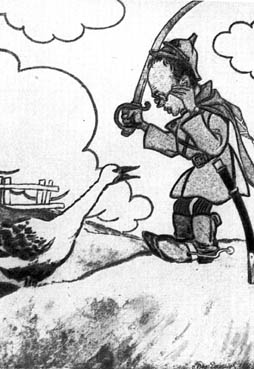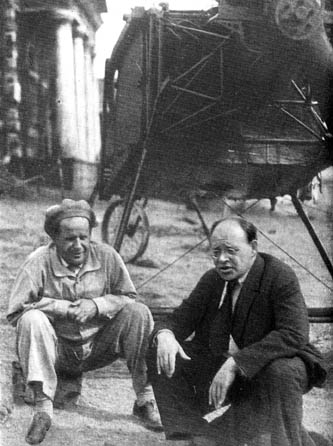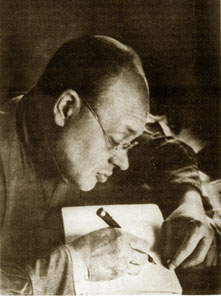March 25. Berkeley
 I saw The Target (Мишень) two nights ago (dir. Alxander Zeldovich, script by Alexander Zeldovich and Vladimir Sorokin. Ren Film, 2011). My friend Tom Luddy was kind enough to lend me a copy after he returned from the Berlin Film Festival where the The Target premiered.
I saw The Target (Мишень) two nights ago (dir. Alxander Zeldovich, script by Alexander Zeldovich and Vladimir Sorokin. Ren Film, 2011). My friend Tom Luddy was kind enough to lend me a copy after he returned from the Berlin Film Festival where the The Target premiered.
The Target may be strong stuff for some but, I am not among them. For me, this is a visually grating (on purpose, of course) art-house film. Thought provoking? Yes, by the ton, and here is what it has provoked me into thinking.
I understand Vladimir Sorokin's thing, which Zeldovich chose to explore cinematically. It is to puncture the romantic illusion, whether the "good, true, and beautiful" of the 19th-cetury intelligentsia ideology or its later incarnations in socialist realism, and post-Stalin critical art and fiction (say, Solzhenitsyn). But if what you aim at is art, you cannot actually destroy illusion, because in art, illusion is indispensable. What ultimately happens when you try to do away with illusion is that you either stop producing art and have an analytical critique instead, or you simply replace one illusion with another, most likely, the opposite of your original target (pun intended).
The Target may be strong stuff for some but, I am not among them. For me, this is a visually grating (on purpose, of course) art-house film. Thought provoking? Yes, by the ton, and here is what it has provoked me into thinking.
I understand Vladimir Sorokin's thing, which Zeldovich chose to explore cinematically. It is to puncture the romantic illusion, whether the "good, true, and beautiful" of the 19th-cetury intelligentsia ideology or its later incarnations in socialist realism, and post-Stalin critical art and fiction (say, Solzhenitsyn). But if what you aim at is art, you cannot actually destroy illusion, because in art, illusion is indispensable. What ultimately happens when you try to do away with illusion is that you either stop producing art and have an analytical critique instead, or you simply replace one illusion with another, most likely, the opposite of your original target (pun intended).
Let's consider the first possibility: The Target is a kind of an allegorical analysis of the human condition in the hydrocarbon-dependent and criminally corrupt Russia of the not-so-distant future. Those deluxe Russians, who have risen to the top of the pyramid and who think they are smart, beautiful and (this is the sci-fi twist, the dystopian part) entitled to eternal youth, are, in fact, ugly, stupid, and have a remarkable short life-expectancy. The sex scenes are abundant, in-your-face graphic, and telling - less fun to watch than a barn yard romance.
They are Sorokin's version of an old school Russian literature teacher's question to an eighth-grade cretin.
The dialogue goes something like this:
The dialogue goes something like this:
Like, teach, I haven't like finished the book yet but I think he like just wanna hump her, you know, like a dog, like from behind...
What these Russian creatures call love, Sorokin and Zeldovich seem to be saying to us, is nothing but an animal urge, not even to procreate, though the central couple (an oil minister "Karenin" and his bored wife "Anna") are trying to conceive - need I say, unsuccessfully - but to dominate, to crush your partner.
OK. We get the allegory: Putin's or Putin-Medvedev's Russia is nothing but a criminally corrupt enterprise that has no future or, rather, one like the present only slicker and bleaker than today. One of the male characters, played by Vitaly Kishchenko is a sex maniac mafioso and a biker (a "Vronsky" stud type), who looks suspiciously like Putin, especially as he rides his futuristic cruising bike or is transported to his death after his criminal enterprise crashes.
| Kishchenko and Zeldovich |
To add a bit of complexity, the framing message is that USA is nowhere to be seen and the dominant cultural and everything else power is - you guessed it - China. There is an occasional Chinese face but, for the most part, the them is felt through Leonid Desyatnikov's minimalist score, with a bit of a Chinese musical lilt grafted onto it. A lot of people hold similar views, and as they watch this film, I imagine while checking email on their iphones, they may nod approvingly to having their thinking confirmed by the flickering screen.
My educated guess is that most people, nevertheless, find romance and romantic illusion pleasing. We like romance in the same way that the people who do not believe in Santa find Christmas trees pleasing. Ditto sex. We all know that sex, when seen by an uninvolved spectator, looks ugly - ugly enough, as Freud pointed out at length in The Wolfman, to traumatize a child for life (a Russian child no less!). But most would agree, our voyeuristic inclinations aside, that "doing it" is another matter. This is why the film's dis-illusion, its attempt at disenchanting the magic of romance, makes for an unsuccessful artistic illusion. We already know: (1) "sex is ugly" and (2) life is ugly, too, not to mention brutish, short, and solitary. The author of Anna Karenina thought so following Hobbes, except unlike Hobbs, he thought that it was the state, not nature, that "made us do it."
The art historian Ernst Gombrich once quipped that in engaging with art one can either immerse oneself in an the illusion induced by a work of art or subject it to a rational analysis; but it was impossible to "watch oneself having an illusion." The film Target by Zeldovich and Sorokin invite us to watch ourselves being disabused of the illusion that we do not have.
And yet, the film is worth seeing. I was taken by a few scenes that experts with a taste for Sots-Art, the post-modern legacy of the Stalinist aesthetic, may find amusing enough to endure the rest of the feature. The shots of the over-the-top affluence of the nouveau Russian country estates evokes the canvases extolling the abundance of Stalin's collective farms and the corresponding Stalinist celluloids. And the village that specializes in selling rejuvenation and life eternal looks suspiciously like Brat's native realm. So, there are a few worthy nuggets in dem da hills, even if it takes a bit of sweating and digging to get to them. A juxtaposition of another political heavy hitter, Balabanov's Cargo 200, and Target would make for an interesting essay (Balabanov's Putin-like biker Alexey Poluyan v Zeldovich's Putin-like biker Kishchenko)... As would juxtapositions of the film adaptations of the greatest nihilistic novel of all times, Oprah's favorite "Anna Karenina." I may actually show Target in class next year when I teach the novel.
PS. 9/5/11. Target has just been screened at the Telluride Film Festival. The NYT critic A.O. Scott called it "an astonishing piece of visionary futurism" and one that caused him to experience "sublime puzzlement." I hope this billing will elicit in some American distributors an equally sublime desire to show Target in the US.
PPS. September 27, 2011. The film will be shown at Stanford, with a round table discussion to follow on November 10 at 6 pm (venue TBD). Discussants: Alexander Zeldovich, Vladimir Sorokin, Gregory Freidin (Professor of Slavic Languages and Literatures, Stanford), and Tom Luddy (Director, Telluride Film Festival).
PPS. September 27, 2011. The film will be shown at Stanford, with a round table discussion to follow on November 10 at 6 pm (venue TBD). Discussants: Alexander Zeldovich, Vladimir Sorokin, Gregory Freidin (Professor of Slavic Languages and Literatures, Stanford), and Tom Luddy (Director, Telluride Film Festival).



